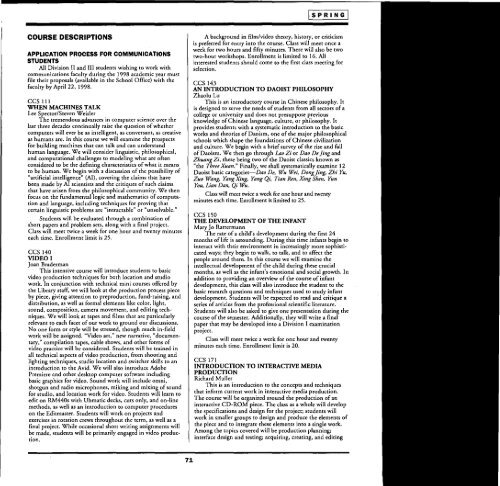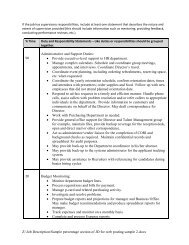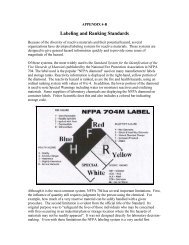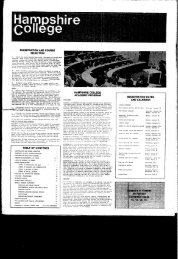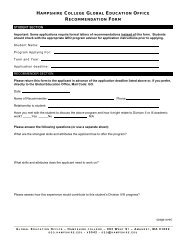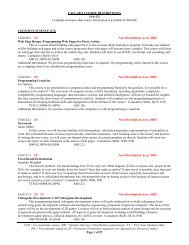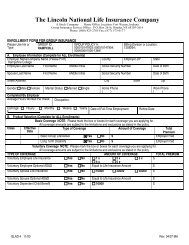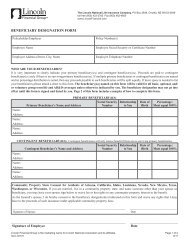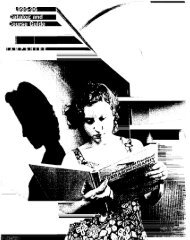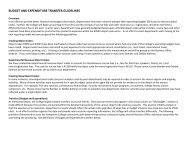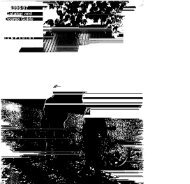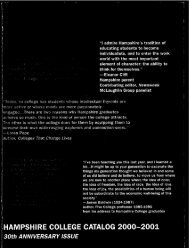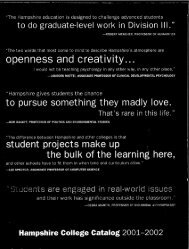school of social science - Hampshire College
school of social science - Hampshire College
school of social science - Hampshire College
You also want an ePaper? Increase the reach of your titles
YUMPU automatically turns print PDFs into web optimized ePapers that Google loves.
COURSE DESCRIPTIONS<br />
APPLICATION PROCESS FOR COMMUNICATIONS<br />
STUDENTS<br />
All Division II and III students wishing to work with<br />
communication" faculty during the 1998 academic year must<br />
file their proposals (available in the School Office) with the<br />
faculty by April 22. 1998.<br />
CCS 111<br />
WHEN MACHINES TALK<br />
Lee SpeccoclSteven Weisler<br />
The tremendous advances in computer <strong>science</strong> over the<br />
last three decades continually raise the question <strong>of</strong> whether<br />
computers will ever be as intelligent, as conversant, as creative<br />
as humans are. In this course we will examine the prospects<br />
for building machines that can talk and can understand<br />
human language. We will consider linguistic, philosophical.<br />
and computational challenges to modeling what are <strong>of</strong>ten<br />
considered to be the defining characteristics <strong>of</strong> what it means<br />
(0 be human. We begin whh a discussion <strong>of</strong> the possibility <strong>of</strong><br />
"artificial intelligence" (AI), covering the claims that have<br />
been made by AI scientists and the critiques <strong>of</strong> such claims<br />
that have arisen from the philosophical community. We then<br />
focus on the fundamental logic and mathematics <strong>of</strong> computation<br />
and language, including techniques for proving that<br />
certain linguistic problems are "intractable" or "unsolvable."<br />
Students will be evaluated through a combination <strong>of</strong><br />
short papers and problem sets, along with a final project.<br />
Class will meet twice a week for one hour and twenty minutes<br />
each time. Enrollment limh is 25.<br />
CCS 140<br />
VIDEO I<br />
Joan Braderman<br />
This intensive course will introduce students to basic<br />
video production techniques for both location and studio<br />
work. In conjunction with technical mini courses <strong>of</strong>fered by<br />
the Library staff, we will look at the production process piece<br />
by piece, giving anention to preproduction, fund-raising, and<br />
distribution, as well as formal elements like color. light.<br />
sound. composition, camera movement, and editing techniques.<br />
We will look at tapes and films that are particularly<br />
relevant to each facet <strong>of</strong> our work to ground our discussions.<br />
No one form or style will be stressed, though much in-field<br />
work will be assigned. "Video art," new narrative, "documentary,"<br />
compilation tapes. cable shows, and other forms <strong>of</strong><br />
video practice will be considered. Students will be trained in<br />
all technical aspects <strong>of</strong> video production, from shooting and<br />
lighting techniques, studio location and switcher skills to an<br />
introduction to the Avid. We will also introduce Adobe<br />
Premiere and other desktop computer s<strong>of</strong>tware including<br />
basic graphics for video. Sound work will include omni,<br />
shotgun and radio microphones, miking and mixing <strong>of</strong> sound<br />
for studio, and location work for video. Students will learn to<br />
edit on RM440s with Uhmatic decks, cuts only, and on-line<br />
methods, as well as an introduction to computer procedures<br />
on the Editmascer. Students will work on projects and<br />
exercises in rocation crews throughout the term, as well as a<br />
final project. While occasional short writing assignments will<br />
be made, scudents will be primarily engaged in video production.<br />
71<br />
ISPRING I<br />
A background in film/video theory, history. or criticism<br />
is preferred for entry into the course. Class will meet once a<br />
week for two hours and fifty minutes. There will also be two<br />
two-hour workshops. Enrollment is limited to 16. All<br />
interested students should come to the first class meeting for<br />
selection.<br />
CCS 143<br />
AN INTRODUCTION TO DAOIST PHILOSOPHY<br />
Zhaolu Lu<br />
This is an introductory course in Chinese philosophy. It<br />
is designed to serve the needs <strong>of</strong> students from all sectors <strong>of</strong> a<br />
college or university and does not presuppose previous<br />
knowledge <strong>of</strong> Chinese language. culture. or philosophy. It<br />
provides students with a systematic introduction to the basic<br />
works and theories <strong>of</strong> Daoism. one <strong>of</strong> the major philosophical<br />
<strong>school</strong>s which shape the foundations <strong>of</strong> Chinese civilization<br />
and culture. We begin with a brief survey <strong>of</strong> the rise and fall<br />
<strong>of</strong> Daoism. We then go through Lao Zi or Dao De jing and<br />
Zhuang Zi, these being two <strong>of</strong> the Daoist classics known as<br />
"the Three Xuan." Finally, we shall systematically examine 12<br />
Daoist basic categories-Dao Dc. Wu Wei, DongJing. Zhi Yu.<br />
Zuo Wang. Yang Xing. Yang Qi. Tian Ren. Xing Shen. Yun<br />
You, Lian Dan, Qi Wu.<br />
Class will meet twice a week for one hour and twenty<br />
minutes each time. Enrollment is limited to 25.<br />
CCS 150<br />
THE DEVELOPMENT OF THE INFANT<br />
Mary Jo Rattermann<br />
The rate <strong>of</strong> a child's development during the first 24<br />
months <strong>of</strong> life is astounding. During this time infants begin to<br />
interact with their environment in increasingly more sophisticated<br />
ways; they begin to walk, to talk, and [0 affect the<br />
people around them. In this course we will examine the<br />
intellectual development <strong>of</strong> the child during these crucial<br />
months. as well as the infant's emotional and <strong>social</strong> growth. In<br />
addition to providing an overview <strong>of</strong> the course <strong>of</strong> infant<br />
development. this class will also introduce the student to the<br />
basic research questions and techniques used to study infant<br />
development. Students will be expected to read and critique a<br />
series <strong>of</strong> articles from the pr<strong>of</strong>essional scientific literature.<br />
Students will also be asked to give one presentation during the<br />
course <strong>of</strong> the semester. Additionally, they will write a final<br />
paper that may be developed into a Division I examination<br />
project.<br />
Class will meet twice a week for one hour and twenty<br />
minutes each time. Enrollment limit is 20.<br />
CCS 171<br />
INTRODUCTION TO INTERACTIVE MEDIA<br />
PRODUCTION<br />
Richard Muller<br />
This is an introduction to the concepts and techniques<br />
that inform current work in interactive media production.<br />
The course will be organized around the production <strong>of</strong> an<br />
interactive CD-ROM piece. The class as a whole will develop<br />
the specifications and design for the project; students will<br />
work in smaller groups to design and produce the elements <strong>of</strong><br />
the piece and to integrate these elements into a single work.<br />
Among the topics covered will be production planning;<br />
interface design and testing; acquiring, creating, and editing


